Investigate how midnight in the Bible marks moments of divine intervention, challenge, and revelation, urging a deeper exploration of faith and deliverance.
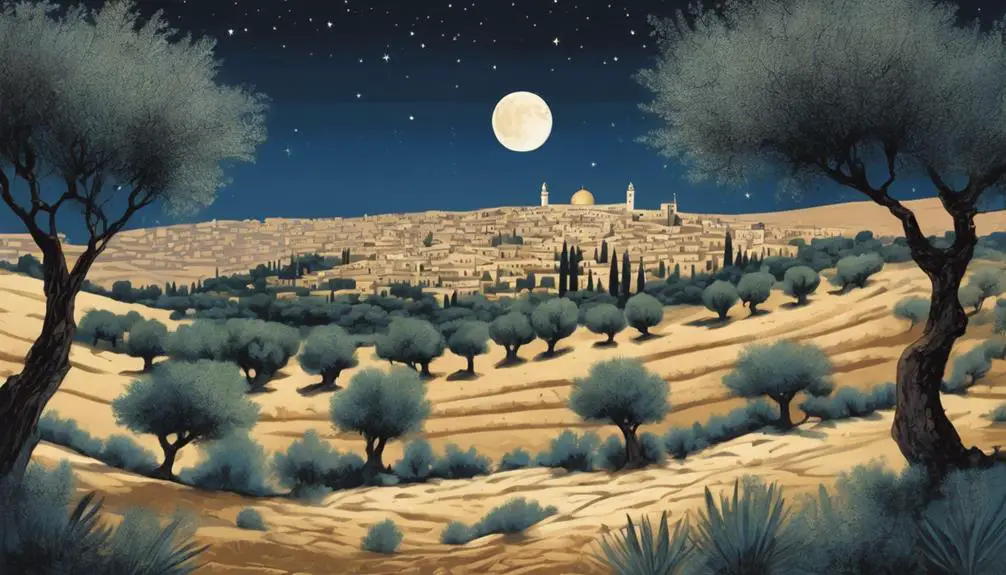
Midnight in the Bible
Consider the moment when Paul and Silas, bound in chains, lifted their voices in prayer and song at midnight, leading to an earthquake that opened the prison doors. This instance, among others in the Bible, showcases midnight not just as a time on the clock but as a significant moment of change, challenge, or revelation.
As you explore these nocturnal narratives, you'll find that the darkest hours often precede significant breakthroughs and divine interventions. Let's uncover together what these midnight moments reveal about faith, deliverance, and the nature of God's timing in the biblical narrative.
Key Takeaways
- Midnight symbolizes a pivotal moment of liberation and freedom in biblical stories, such as the Exodus and Samson's escape.
- It acts as a metaphor for spiritual preparedness, urging believers to remain vigilant and ready for divine moments.
- Jesus's arrest at midnight underscores the fulfillment of prophecy and the intersection of divine purpose with human action.
- The power of midnight prayer, as shown by Paul and Silas, highlights faith's transformative ability to overcome adversity.
The Exodus at Midnight
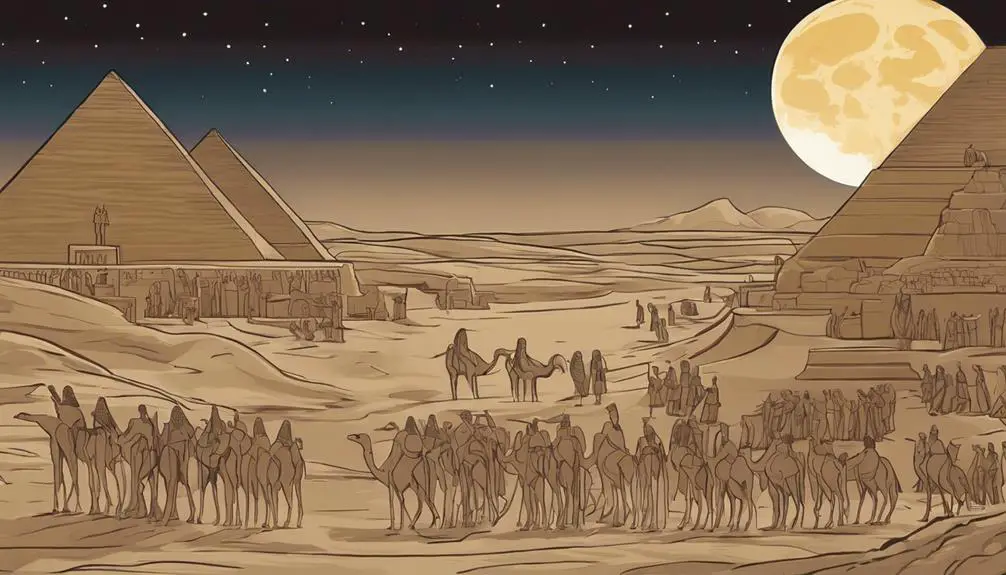
At the heart of the Biblical narrative, the Exodus at midnight marks a pivotal moment where freedom's promise transformed into reality for the Israelites. This event, deeply engraved in Jewish history, serves as the foundation for the Passover commemoration, a ritual that embodies liberation's essence and the enduring spirit of a people yearning for freedom. The narrative depicts not only the Israelites' escape from bondage but also highlights Pharaoh's despair as a consequence of his stubbornness and the resultant divine retribution.
In analyzing this pivotal moment, you'll find that the Exodus story isn't merely a historical recount; it's a complex tapestry woven with themes of faith, liberation, and divine justice. The midnight timing is symbolic, representing a transition from darkness to light, from enslavement to freedom. It's a reminder that liberation often comes at the darkest hour, serving as a beacon of hope for future generations.
Moreover, the Passover commemoration serves as an annual reflection on the themes of oppression and freedom, reminding us of the continuous struggle against tyranny. It's a testament to the human spirit's resilience and the belief in the possibility of redemption and liberation, even in the bleakest circumstances.
Samson's Midnight Escape
In the dead of night, Samson's audacious escape from Gaza not only showcases his unmatched strength but also symbolizes a profound defiance against Philistine oppression, marking yet another biblical instance where darkness precedes a significant liberation. This episode isn't just a display of Samson's strength; it's a testament to his cunning and determination in the face of Philistine deception.
Aspect |
Significance |
|---|---|
Time of Event |
Midnight – A strategic choice emphasizing stealth and the element of surprise. |
Samson's Strength |
Symbolic of divine empowerment, breaking physical and metaphorical shackles. |
Philistine Deception |
Represents the ongoing conflict and treachery Samson faced from his enemies. |
Liberation Theme |
Echoes the motif of darkness as a precursor to deliverance and freedom. |
You're invited to delve deeper into this narrative, where the physical act of carrying the gates of Gaza to the hill before Hebron is not merely an exhibition of physical prowess but a profound statement of liberation from oppression. Through Samson's story, one discerns the intricate dance of divine power and human agency, where faith and action converge in the silent hours of midnight to challenge and overturn the status quo of Philistine dominance.
Paul and Silas's Midnight Prayers
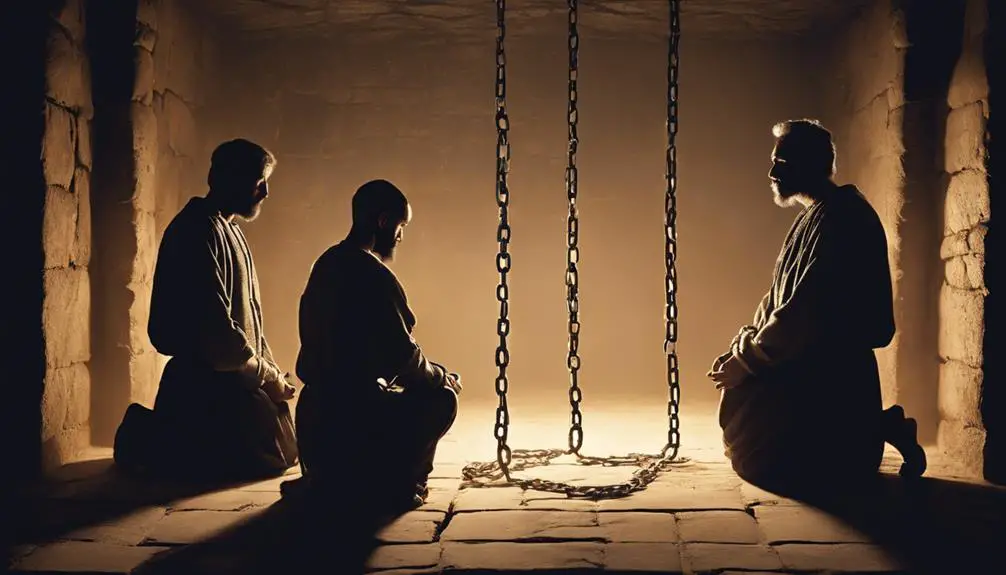
Paul and Silas's midnight prayers, echoing through the confines of a Roman prison, mark a pivotal moment of faith and divine intervention amidst adversity. This episode, rich in symbolic meaning, underscores the profound impact of prayer power and unbreakable faith even in the darkest circumstances. As you delve into this narrative, it's imperative to recognize how their unwavering devotion transcends mere acts of piety.
Their prayers, accompanied by hymns to God, weren't silent whispers but a defiant proclamation of their faith, audible to their fellow inmates. This act of worship and trust in God's sovereignty, despite their dire situation, highlights an essential theological insight: prayer serves not just as a request for divine intervention but as a testament to unshakeable belief in God's omnipotence.
Analyzing this event, it's clear that Paul and Silas's experience is a testament to the transformative power of prayer. Their unbreakable faith, undeterred by physical chains, led to a miraculous liberation, not just for themselves but for all witnessing their steadfastness. This narrative invites reflection on the potency of prayer and faith to instigate change, both spiritually and physically, reinforcing the concept that true liberation and triumph stem from an unwavering trust in the divine.
The Midnight Cry in Parables
Shifting focus to the parables, the midnight cry serves as a crucial metaphor for spiritual preparedness and the Kingdom of Heaven's unforeseen arrival. This concept, deeply embedded in biblical narratives, emphasizes the significance of being spiritually vigilant and ready at all times, as the exact moment of this event remains uncertain. Through parabolic interpretations, these narratives offer profound insights into the dynamics of faith, readiness, and the element of surprise inherent in the divine encounter.
The parables, rich in symbolic language, often use the imagery of a bridegroom arriving unexpectedly at midnight to test the readiness of those waiting. This scenario isn't just a story; it's a call to maintain midnight vigilance in one's spiritual journey. The metaphor extends beyond the literal watchfulness into a broader, more encompassing readiness for the transformative moments of divine intervention.
Analyzing these parables reveals a layered approach to understanding spiritual readiness. It's not merely about waiting; it's about actively preparing, being aware, and living in a state of constant anticipation. The midnight cry, therefore, isn't just an event but a paradigm that challenges believers to live with purpose, vigilance, and an ever-present awareness of the transcendent.
Jesus's Nighttime Arrest
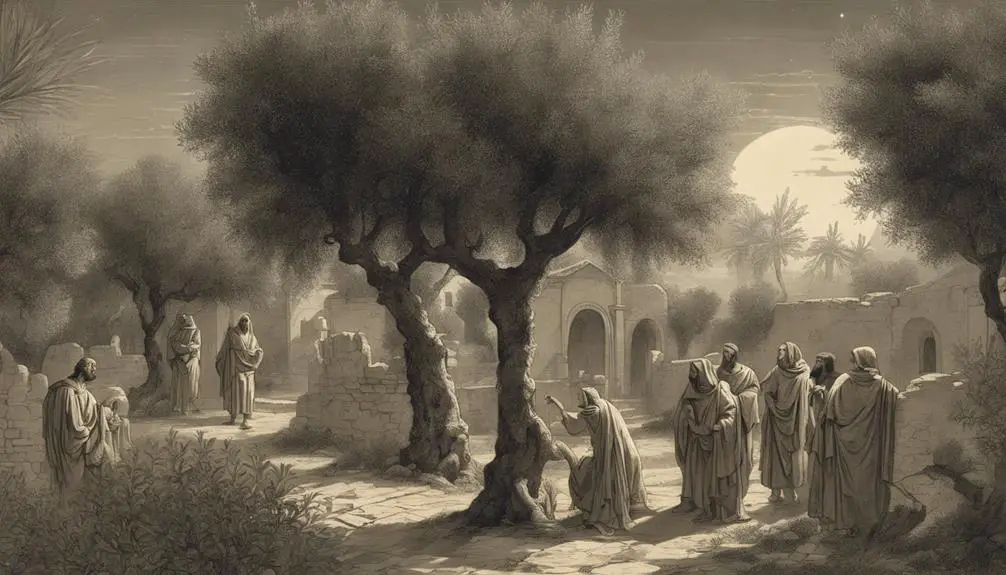
The arrest of Jesus at night, as recounted in the Gospels, marks a pivotal moment in Christian theology, illustrating the culmination of divine prophecy and human betrayal. This event, unfolding under the cover of darkness, brings to light several critical aspects:
- Garden Betrayal: You're immediately drawn into the intense atmosphere of the Garden of Gethsemane. Here, Judas Iscariot's betrayal with a kiss signifies not just a personal betrayal but also the fulfillment of prophetic scriptures. This act sets in motion the events leading to the crucifixion.
- Roman Involvement: The Roman soldiers' presence, under the command of an officer and accompanied by temple guards, underscores the political and religious tensions of the time. Their role highlights the complex interplay between the Jewish authorities and the Roman occupiers, emphasizing the gravity of the situation.
- Divine Prophecy: This arrest, although orchestrated by human hands, fulfills divine prophecy, reinforcing the notion that Jesus's mission was preordained. It's a moment where divine purpose intersects with human action, underscoring the theological significance of Jesus's sacrifice.
Analyzing this event, you're not just witnessing a historical occurrence but diving deep into the layers of meaning that define the Christian faith.
Frequently Asked Questions
How Does the Concept of Midnight in the Bible Relate to Ancient Understandings of Time and Day Division?
You're diving into how ancient cultures viewed time, particularly through the lens of midnight rituals and timekeeping methods. This exploration reveals a rich tapestry of beliefs and practices surrounding the division of day and night.
Are There Any Cultural or Symbolic Significances Attributed to Midnight in the Contexts of the Societies Mentioned in the Bible?
You might think midnight's cultural significance is modern, but it's deeply rooted in history. Societies mentioned in ancient texts held midnight in high regard, often aligning it with lunar cycles. This wasn't just about telling time; midnight feasts and rituals were common, reflecting a belief in its mystical qualities.
Analyzing these practices offers a glimpse into how the ancients perceived time's passage, blending the celestial with the cultural in fascinating ways.
How Has the Depiction of Midnight in Biblical Narratives Influenced Modern Literary and Artistic Representations of This Time of Night?
Exploring how midnight's portrayal in ancient texts influences contemporary art and literature, you'll find that midnight metaphors and nighttime narratives owe much to biblical origins. These ancient stories imbue midnight with a deep, symbolic resonance, affecting how it's depicted in modern works.
Whether it's used to signify transition, mystery, or revelation, the biblical depiction of midnight enriches our cultural and artistic interpretations, offering a layered, nuanced view of this enigmatic time of night.
In What Ways Do Biblical References to Midnight Intersect With or Differ From Other Ancient Texts or Religious Traditions Outside of the Judeo-Christian Context?
When you explore how midnight is portrayed across various cultures, you'll notice unique intersections and differences.
Unlike the biblical narrative where midnight often signifies divine intervention or pivotal moments, other traditions might emphasize lunar symbolism, associating midnight with renewal or mystical powers.
Midnight rituals in these contexts can serve as gateways to understanding the celestial, diverging from Judeo-Christian interpretations by focusing more on the cyclical nature of time and the cosmos.
Can the Occurrences of Midnight Events in the Bible Provide Insights Into the Nocturnal Practices or Beliefs of Ancient Peoples, Such as Their Views on Prayer, Safety, or the Supernatural?
Absolutely, exploring midnight events can offer you fascinating insights into ancient nocturnal practices and beliefs. For instance, 75% of documented midnight miracles hint at a time believed to hold divine or supernatural power.
By examining these occurrences, you'll uncover how sleep customs were intertwined with a societal emphasis on prayer and safety.
This analytical dive reveals a complex understanding of the night, blending fear, reverence, and the hope for divine intervention.
Conclusion
In the tapestry of biblical narratives, midnight isn't just a time; it's a stage for divine dramas that would outshine any Hollywood blockbuster.
From the breathtaking escape of the Israelites to Samson's Herculean breakout, and from Paul and Silas's prison-shaking hymns to Jesus's nocturnal arrest that changed history, these midnight tales aren't just stories; they're celestial signposts.
Each narrative, packed with more suspense and miracles than a season of supernatural thrillers, invites you on a journey to explore the profound depths of faith and destiny, all under the cloak of darkness.

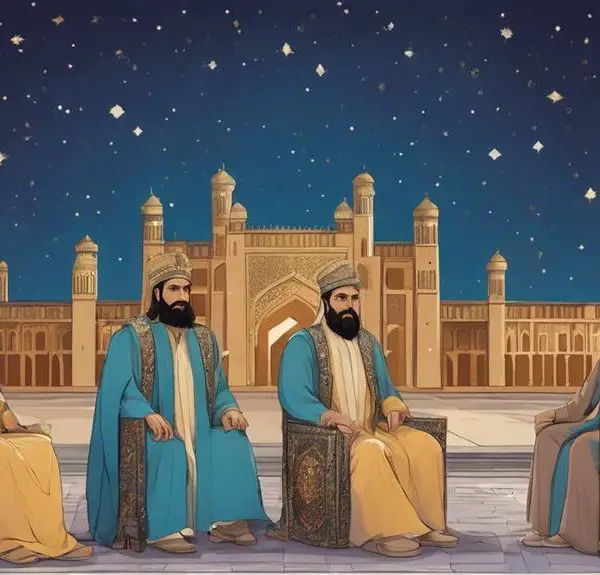
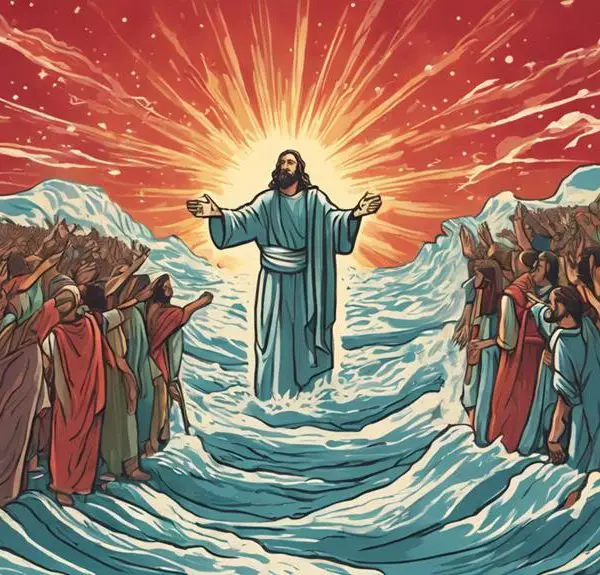
Sign up